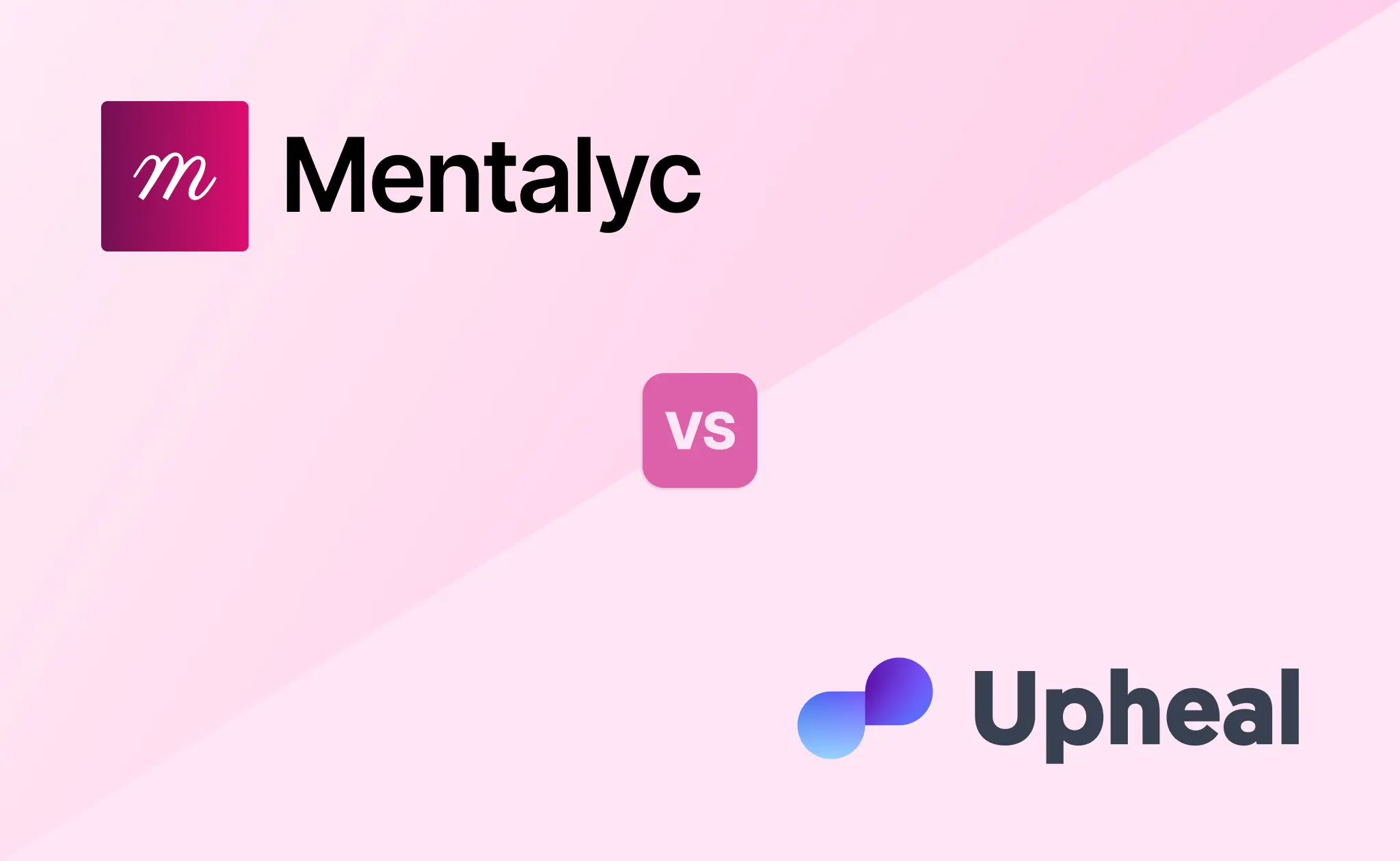Mentalyc vs Upheal – Features, Price, and Key Comparison
Many therapists are turning to AI – and it’s a total game-changer. These smart tools take the weight off writing detailed session notes, freeing up your time so you can focus on what matters most: your clients. We’ve taken a close look at two leading platforms – Mentalyc vs Upheal – to help you choose the one that best fits your values, workflow, and the care you aim to provide.
AI-powered therapy tools are not just emerging—they’re essential. The global behavioral-health AI market is projected to grow from $88 billion in 2024 to $132 billion by 2032—a 50% jump in just eight years, underscoring the vital role platforms like Mentalyc and Upheal now play.
So, Mentalyc or Upheal – which is better? Both platforms are U.S.-based, HIPAA-compliant, built specifically for mental health professionals, and designed to ease the burden of documentation while offering smart clinical insights. They both promise to streamline workflows with AI-assisted mental health documentation. But if you’re a therapist looking for the best fit, the question is: Which platform is better for therapy notes – Mentalyc or Upheal? It’s time to break it down – because when it comes to tools that shape your clinical workflow, the magic is in the details.
Mentalyc vs Upheal – Full Comparison Guide
| Feature | Mentalyc | Upheal |
| HIPPAA & SOC2 compliance | ✅ | ✅ |
| Data not used for model training | ✅ | ❌ |
| Full suport for All Client Types (individual, group, couple, family, child) | ✅ | ❌ |
| Recording options (in-person, telehealth, dictation, typing a summary) | ✅ | ✅ |
| SMART Treatment Plan & Progress Tracking | ✅ | ❌ |
| Supervision notes | ✅ | ❌ |
| Therapeutic Alliance Analytics | ✅ | ❌ |
Mentalyc vs Upheal for Privacy and Compliance — Which Platform Handles Your Clients’ Data More Securely?
In therapy, trust is everything, and that trust extends to how client data is handled. It’s not enough for platforms to claim HIPAA compliance; they must back it up with secure infrastructure, clear data policies, and proper agreements like the Business Associate Agreement (BAA). Client consent, encryption, and responsible data practices aren’t optional – they’re the baseline for any HIPAA-compliant note-taking for therapists or therapy software with treatment planning in 2025.
In 2025, as therapists become more discerning about their software, data protection is no longer just a feature – it’s a non-negotiable requirement. With data privacy laws like HIPAA, PHIPA, PIPEDA, and GDPR evolving, therapists need tools built for secure data handling, not just documentation.
According to the American Psychological Association (APA), about 1 in 10 psychologists are already using AI tools to streamline practice management and documentation.
So, when it comes to privacy and compliance, which is the best AI therapy software – Upheal or Mentalyc?
Is Mentalyc more secure than Upheal for therapists who prioritize HIPAA-compliant note-taking? Let’s dive in.
Mentalyc
✅ Data Privacy Designed for Therapists — How Mentalyc Protects Your Clients
Mentalyc understands how critical confidentiality is in therapy. That’s why it’s built to keep client information safe, secure, and fully compliant with privacy laws like HIPAA, PHIPA, PIPEDA, and the New Zealand Privacy Act. When therapists sign up, they receive a Business Associate Agreement (BAA), which legally commits the platform to protecting their sensitive data with the utmost care.
✅ HIPAA-Compliant Note-Taking for Therapists with Control and Clarity
Mentalyc makes session transcripts easy to access, review, or download anytime. Therapists have full control and can delete transcripts whenever they wish. For those on the SUPER Plan, transcripts can be set to delete automatically, simplifying data management. This level of control supports HIPAA-compliant note-taking and aligns with the need for automated therapy progress notes that are both secure and flexible.
✅ How Mentalyc Handles and Secures Data
By default, transcripts used to generate notes are fully de-identified to protect privacy. If extra context is needed, such as first names, partial de-identification can be enabled. Audio recordings are securely stored for up to three days to allow for quick fixes or retries and then automatically deleted.
Mentalyc never shares or sells client data. All information is kept in a secure, controlled environment built to meet the highest security standards, including HIPAA and SOC 2 Type II compliance, ensuring secure data handling for therapists.
For clinicians wondering “Should I use Mentalyc or Upheal?”, this level of security and control is a major point of comparison when evaluating privacy features.
✅ Transparent, Client-Friendly Consent
Mentalyc provides therapists with a clear and straightforward consent template designed to explain both the benefits and risks of using the platform. This transparency helps build trust between therapists and their clients and reinforces Mentalyc’s position among clinician-friendly AI tools.
✅ Data not used for model training
Mentalyc doesn’t use your data to train AI models — a critical factor when evaluating Mentalyc vs Upheal for private practice.
Upheal
✅ Trusted Privacy Standards
Upheal follows all the important privacy laws like HIPAA, PHIPA, PIPEDA, GDPR, and the UK Data Protection Act. When therapists sign up, they agree to a clear Business Associate Agreement (BAA) that guarantees their clients’ data is handled with care and respect. This level of compliance makes it a serious contender in the “Mentalyc or Upheal – which offers better HIPAA compliance?” evaluation for mental health professionals.
✅ Your Data Stays Yours
Upheal has a strict policy: client data is never sold or shared with third parties or data brokers.
✅ Easy, Flexible Control Over Your Data
You can set your sessions or transcripts to automatically delete after a time that works for you, with a 4-day window to recover if needed. This applies to all your past and future data. Just keep in mind that deleting transcripts means some features, like reprocessing notes or treatment planning, won’t work. This flexible setup appeals to those comparing Upheal or Mentalyc – which is easier to use?
✅ Simple Ways to Get Client Consent
Upheal makes it easy to collect client consent in a way that fits your practice:
- Email a ready-to-use consent form
- Download a template to customize
- Add Upheal’s terms into your consent form
❌ Confusing policy for AI training
The AI usage policy is hard to follow – it’s dense and easy to miss important details that are crucial for ethical transparency. This is often raised in “Upheal vs Mentalyc – what therapists are saying” discussions.
- De-identified data used for AI training: This only includes de-identified data, but it’s not spelled out that no identifiable session content is ever used, raising questions like “Is Mentalyc better than Upheal?”
- Data retention timelines: Transcripts are stored for 1 year, but derivative insights from sessions can be kept for up to 5 years. These separate timelines are easy to overlook, yet they have very different implications and deletion rules.
- Risk: Longer storage periods raise exposure risks, especially if re-identification methods improve over time or if there’s a future breach.
- Visibility of opt-in consent: Whether users even see the AI consent option depends on how the session is held. According to Upheal’s Support Center, the in-app opt-in only shows up if you’re using Upheal’s video platform or Zoom integration.
As TechCrunch warned, many AI platforms “offer convenience at the cost of client confidentiality,” reinforcing the need to prioritize HIPAA-compliant, privacy-forward tools.
Mentalyc vs Upheal Pricing Comparison
| Feature / Plan | Mentalyc | Upheal |
| Free Trial | ✅ | ✅ |
| Paid Plans Start At | USD 14.99 / Month | USD 19 / Month |
| Custom Plans for Groups | ✅ Yes (Group & Enterprise pricing) | ✅ Yes (Team plans available) |
| Audio-Only Recording Support | ✅ Yes (Privacy-focused) | ❌ No (Video required by default) |
| HIPAA-Compliant | ✅ Fully HIPAA-compliant | ✅ HIPAA-compliant |
| Insurance-Ready Notes | ✅ Yes | ⚠️ Partial (Requires editing) |
Mentalyc vs Upheal Notes & Customization – Which Produces Better Clinical Notes?
Every therapist has their own note style and preferences, so let’s see how each platform adapts to that. We’ll look at how flexible the templates are, how accurate the notes feel, and whether they hold up to insurance and compliance standards.
Mentalyc: AI Therapy Software
✅ Trustworthy documentation that clinicians can rely on.
Trusted by clinicians, Mentalyc notes are known for their accuracy, clarity, and structure. Thanks to robust QA mechanisms, Mentalyc ensures note precision that’s hard to find elsewhere. In rare cases where data is missing, the system marks it as N/A – never inventing or guessing. This makes it the go-to for AI-assisted mental health documentation, and a top answer to the question “Which is the best AI note-taking tool for therapists – Mentalyc or Upheal?”
✅ AI-Powered Notes That Work for Therapists
Mentalyc stands out for the quality of its notes, built by a clinician who clearly understands the demands of real-world practice. Notes aren’t just high-quality; they’re designed to fully meet insurance requirements, so you don’t have to second-guess whether your documentation is compliant. The result? insurance-ready mental health notes from a clinician-friendly AI tool.
✅ Built-In Compliance You Can Trust
Documentation is designed to hit all the right marks for insurance and audits. Whether you’re billing Medicaid or working with private insurers, the notes meet 100% of the necessary standards, without the usual stress.
✅ Beyond the Basics: Full Note Coverage
You’re not limited to just intake or progress notes. The tool includes AI support for risk assessments, biopsychosocials, MSEs, safety plans, and more, tailored for therapists across ABA, social work, psychology, and psychiatry.
✅ Customizable Notes to Fit Your Style
Choose from flexible, clinician-designed templates like SOAP, DAP, BIRP, and more. The Template Builder is easy to use—just pick from pre-made, expert-crafted sections and adjust what you need. That level of customization influences the decision when answering “Upheal vs Mentalyc – which one to choose?”
This isn’t generic tech—it’s designed by professionals who understand the therapist’s job. Mentalyc helps you create clear, consistent, and accurate notes with minimal input, while still giving you full control to edit and make them truly your own. So when asking “Should I use Mentalyc or Upheal?”, consider that Mentalyc emphasizes clinician precision over generic convenience.
✅ For Every Kind of Client and Practice Setting
Whether you work with individuals, couples, families, children, or groups, Mentalyc fits right in. From solo practitioners to team-based care and clinical supervision, it’s designed to support the way you practice. That makes it the pick in the “Mentalyc vs Upheal pros and cons” debate for diverse therapist workflows.
✅ Autocomputed CPT codes
❌ No notes for physicians
As the focus is on therapists, there are no notes designed specifically for physicians.
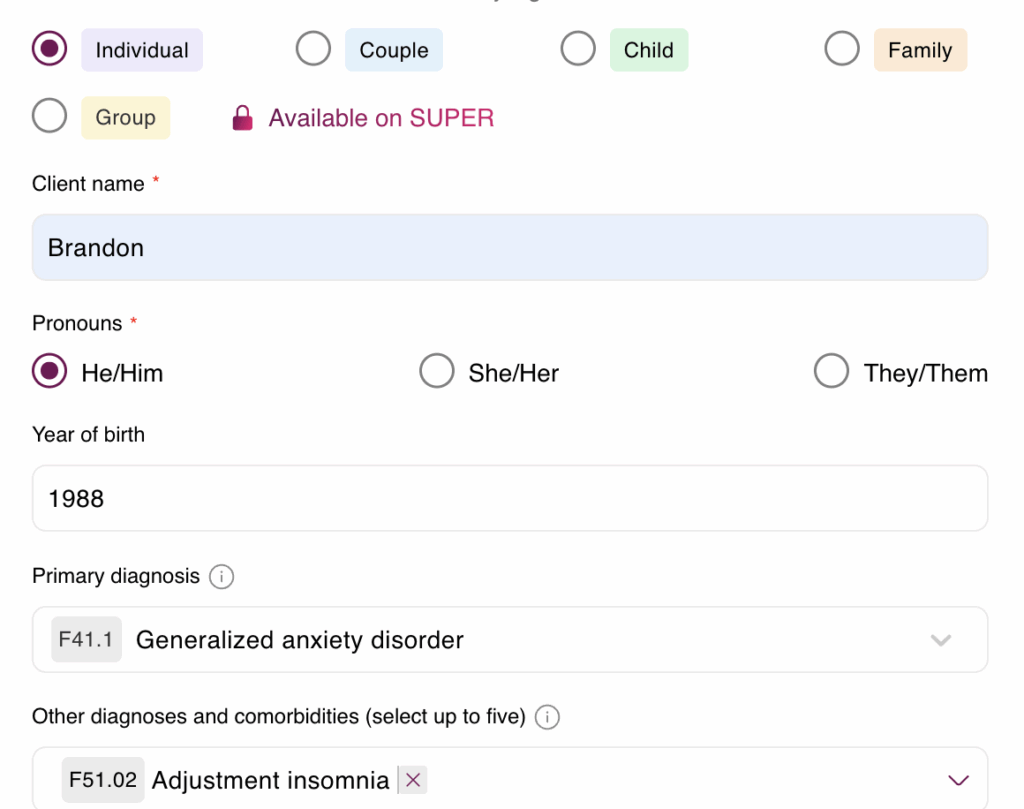
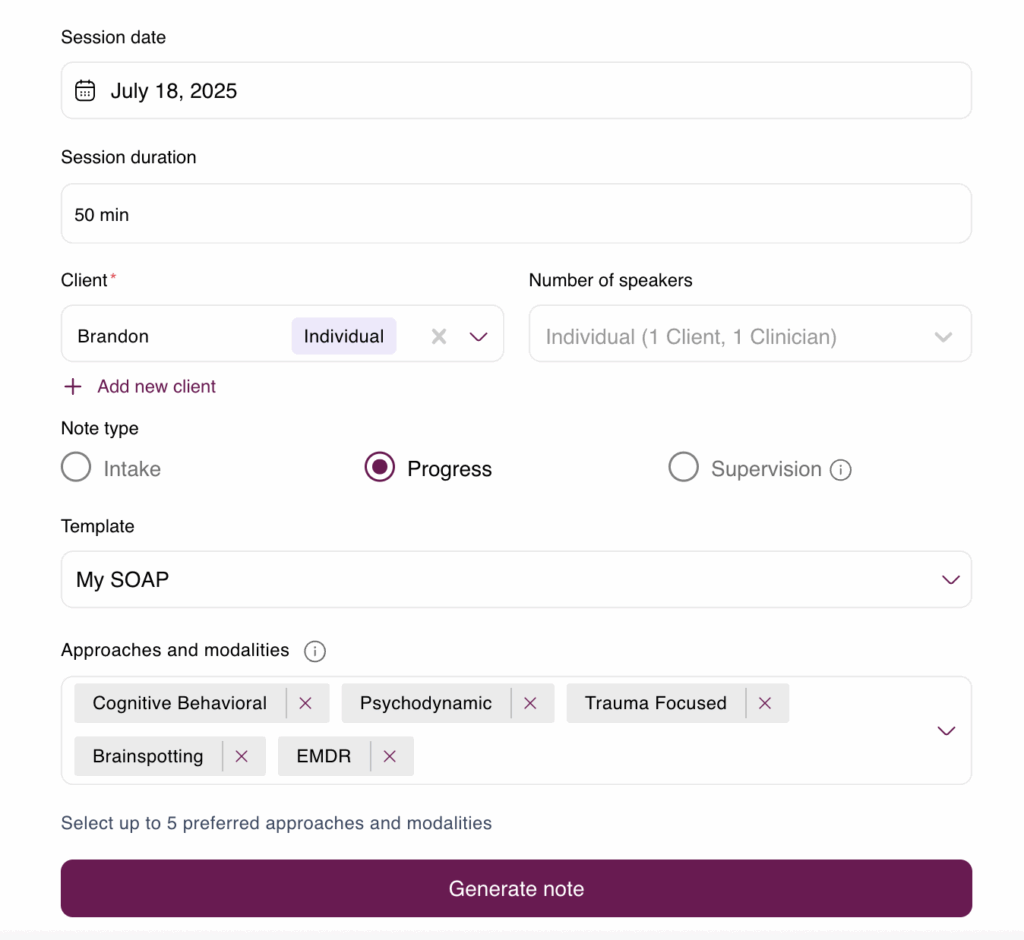
Upheal
✅ Variety of Note Formats
AI-generated notes are structured to align with clinical workflows and documentation standards. You can easily choose from different documentation formats to match your preferred style (e.g., bullet points). This flexibility is important for therapists weighing Mentalyc vs Upheal for mental health professionals.
✅ Wide Range of Individual Templates
Includes comprehensive templates for various clinical needs:
- Intake: Standard Intake, Biopsychosocial Intake Assessment, Psychiatry Intake, Headway Intake
- Progress Notes: SOAP, DAP, BIRP, GIRP, MSE, PIRP, SIRP, PIE
- Other Notes: Summary for Client, Headway SOAP, Safety Plan, Upheal‑formatted options
This extensive set of SOAP, DAP, MSE notes supports therapists seeking robust documentation with insurance-ready mental health notes, a key point in the comparison: Upheal or Mentalyc – what’s better for therapy notes?
❌ No family, children, supervision, and group notes
This gap is significant for those comparing Mentalyc or Upheal for group therapy documentation or practices involving children and supervision.
❌ AI Fills in What Wasn’t Said
If there isn’t enough information (e.g., during dictation), Upheal fills in the gaps on its own – essentially making up parts of the note, which can lead to hallucinated content. That drawback is central to debates like “Mentalyc vs Upheal pros and cons” and impacts trust in clinician-friendly AI tools.
❌ Flexibility that Comes with Caution
Upheal lets you create custom note templates using your own prompts. However, this also means you’re responsible for selecting relevant, clinically approved content. As a result, maintaining note quality, a professional tone, and compliance can be challenging. It may take several attempts to get it right, which can slow you down. Additionally, too much freedom can hurt usability – while it seems flexible, it often confuses by placing the burden on users to craft effective prompts. These usability concerns often arise in discussions like “Mentalyc vs Upheal – which is better?”
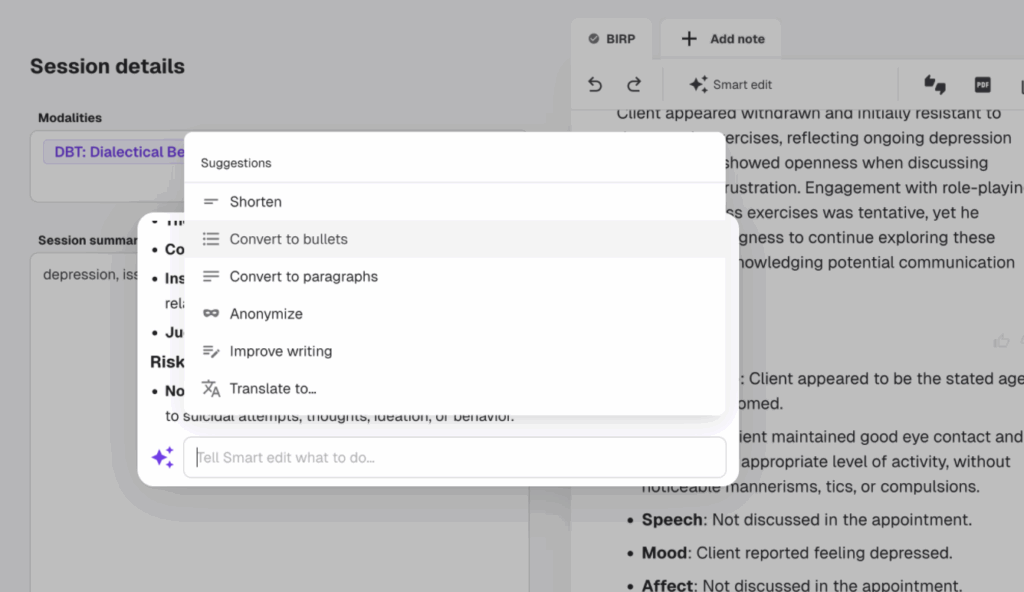
Recording & Integrations: Mentalyc or Upheal – Which One Should I Use?
Let’s take a look at how easily each platform fits into a therapist’s day, from capturing sessions to syncing with your calendar or Electronic Health Records (EHR).
Mentalyc
✅ Flexible Session Capture: In-Person, Online, Your Way
Mentalyc offers multiple ways to capture your sessions—whether you’re working in-person or online. It supports live audio listening during sessions and lets you upload existing recordings for transcription. You can choose to dictate a summary, type it out manually, or use the built-in audio recorder for a smoother workflow.
✅ Privacy First, On-Device Recording
A unique feature of Mentalyc is its on-device recording capability, which ensures that any session recording is only kept on your device until you decide that you want to upload it. Unlike other recording tools, which stream the data to the cloud as the session is being recorded, Mentalyc stores it on your device and gives you control, whether or not to upload the session. This is essential when a client withdraws their consent due to a sensitive topic. This level of control sets Mentalyc apart from other video and audio session capture AI tools, which cannot often pause or prevent automatic cloud syncing in real time.
✅ Seamless Integration with Your Favourite Video Tools
It works nicely with popular video platforms like Zoom and gives you the flexibility to use your video recording tools if you prefer. No need to change your current setup — just plug it into your workflow.
✅ No Video Recording — To Protect Your Privacy
Mentalyc takes a minimalist approach to data storage, keeping only what’s truly necessary to create session notes. Video recording comes with extra privacy and security risks, and many clients are rightfully reluctant to agree to it. By sticking to audio-only, Mentalyc provides greater security and peace of mind.
When it comes to balancing privacy, simplicity, and clinical accuracy, Mentalyc or Upheal – what to choose? The answer depends on whether you prioritize minimal data storage or multimedia session capture.
Upheal
✅ Live Audio & Video
Clinicians who are not so concerned about privacy and appreciate having video available will be glad to know that Upheal supports live audio and video recording during both in-person and virtual sessions. It also lets you upload recordings and choose between dictating or typing summaries. The decision between “Mentalyc or Upheal – best AI for therapists?” ultimately hinges on how essential video recording is to your practice versus prioritizing client comfort and confidentiality.
✅ Built-In Calendar
Upheal offers built-in calendar tools to simplify session management. However, these features often don’t work smoothly, with issues when editing appointments. So when it comes to managing your schedule smoothly, the real question becomes: Mentalyc or Upheal – which fits your practice best?
✅ AI Demo Client
The AI Demo Client is a simulated, AI-powered client that allows therapists to explore the Upheal’s features without needing a real session. It provides a general sense of how transcription and note generation work. While the demo provides a basic walkthrough, real clinical work often reveals deeper distinctions, prompting many therapists to explore, “Mentalyc or Upheal – best AI therapy software in 2025?” before committing to either platform.
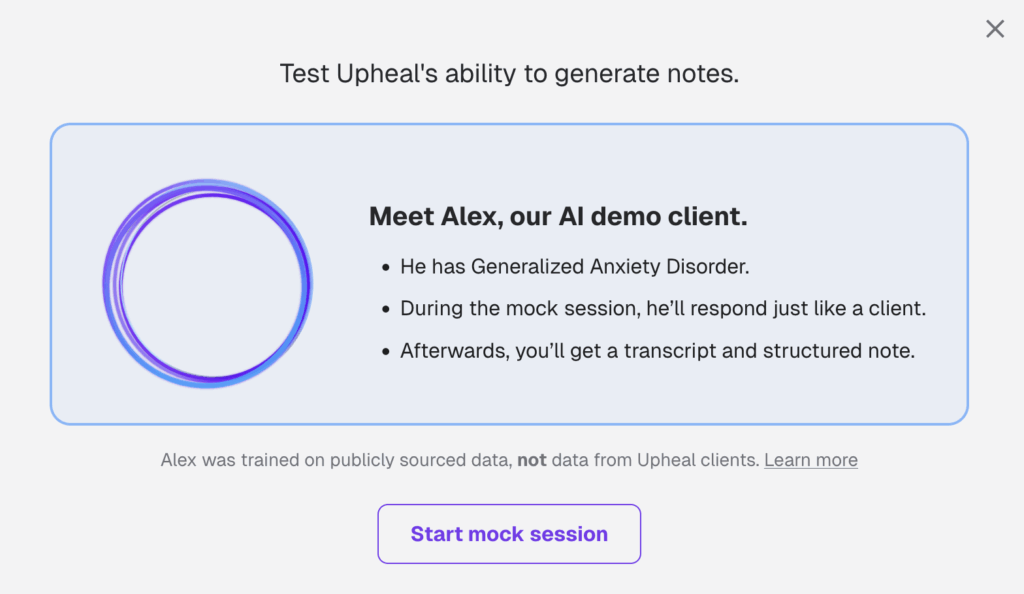
Treatment Planning & Progress: Upheal vs Mentalyc – Unbiased Review
How does each tool handle the treatment planning and tracking progress over time? This section is critical for therapists comparing “Upheal vs Mentalyc – pros and cons” or searching for the best answer to “Upheal or Mentalyc – which platform wins in 2025?”
Mentalyc
✅ Streamlined Intake Process
The platform simplifies treatment planning from the very beginning by guiding you through an efficient intake process to quickly gather essential client information. This helps reduce admin time for clinicians looking for AI for mental health intake and streamlines the documentation process.
✅ Instant, Goal-Focused Treatment Plans
Create customized treatment plans instantly with SMART goals—specific, measurable, achievable, relevant, and time-bound objectives that keep therapy focused and effective.
- Fully adaptable to a variety of therapeutic approaches, including CBT, EMDR, play therapy, PMHNP, and more.
- Supports all client types and settings: individuals, couples, children, and families.
- Includes visual tracking tools and automatic goal references embedded in every session note. These features position Mentalyc as one of the most clinician-friendly AI tools for therapists doing a “Mentalyc vs Upheal AI note comparison” or evaluating therapy software usability for clinicians in real-world practice.
✅ Golden Thread: Seamless Continuity
All session notes are interconnected to maintain context and continuity across meetings, ensuring no important details are lost between sessions.
✅ Progress & Impact Tracking
- Automatically tracks client progress by linking every note back to treatment goals.
- Visual dashboards provide clear insights into client growth over time.
- Enables both therapist and client to see measurable improvements, even when not using a formal treatment plan.
Upheal
✅ SMART Goals Suggestions and Format Flexibility
While Mentalyc takes all of your relevant notes, Upheal makes you choose 3 to include in the treatment plan. Then, choose between objectives that were either discussed during those sessions or suggested by AI. You can easily drag, drop, prioritize, and edit them to fit the plan.
❌ Treatment Plan & Golden Thread Limitations
- Integrates only with certain note templates (SOAP, Enhanced SOAP, Upheal’s template). Other formats don’t link into the Golden Thread yet.
- Works only for individual clients.
- Golden Thread only works with the new Treatment Plan that is in beta.
- Golden Thread doesn’t work without a Treatment Plan; progress notes are tied strictly to predefined goals and interventions.
These are some important points to consider when deciding which is better for therapy notes – Mentalyc or Upheal?
Analytics & Growth: Mentalyc vs Upheal – Which One Handles Data Better?
See how each platform helps you grow as a therapist—by tracking progress, measuring outcomes, and turning data into meaningful insights you can use. This section directly addresses queries like “What’s the difference between Mentalyc and Upheal?” or “Which AI platform offers more accuracy – Mentalyc or Upheal?”
Mentalyc
✅ Unlock Deeper Connections with Alliance Genie™
Mentalyc’s Alliance Genie™ is a smart tool that helps therapists get real-time insights into how their sessions are going, without interrupting the flow. It acts like a virtual supervisor, quietly analyzing your sessions to catch any blind spots you might miss. After each session, it provides a helpful summary and practical guidance so you can fine-tune your approach.
✅ Meaningful Insights that Help You Grow as Therapists
Mentalyc supports your self-reflection and helps build your confidence as a therapist by showing how your therapeutic relationships evolve over time. Whether you work with CBT, psychodynamic, or other modalities, Mentalyc tailors feedback to fit your style. Overall, it’s designed to help you grow, improve, and feel more sure of yourself in your work with clients.
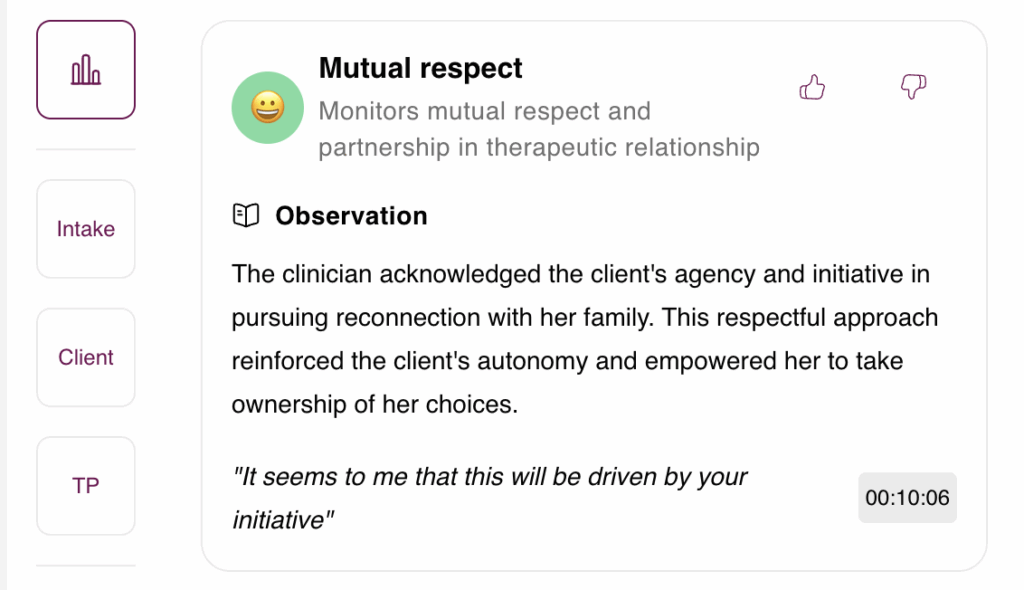
Upheal
❌ Surface-Level Analytics
Upheal offers speech analytics that provide information about the tone of your sessions. It tracks sentiment, tense, talk time ratios, moments of silence, speech cadence, and response time – all visualized through session maps and graphs. However, the data is presented in a way that’s hard to interpret and not easily actionable. Therapists need to invest time in learning how to make sense of the data, which may not directly support clinical decision-making.
❌ Missing Deeper Therapeutic Alliance Insights
Upheal currently lacks deeper therapeutic alliance analytics that could truly enhance therapy and support growth in the therapeutic relationship.
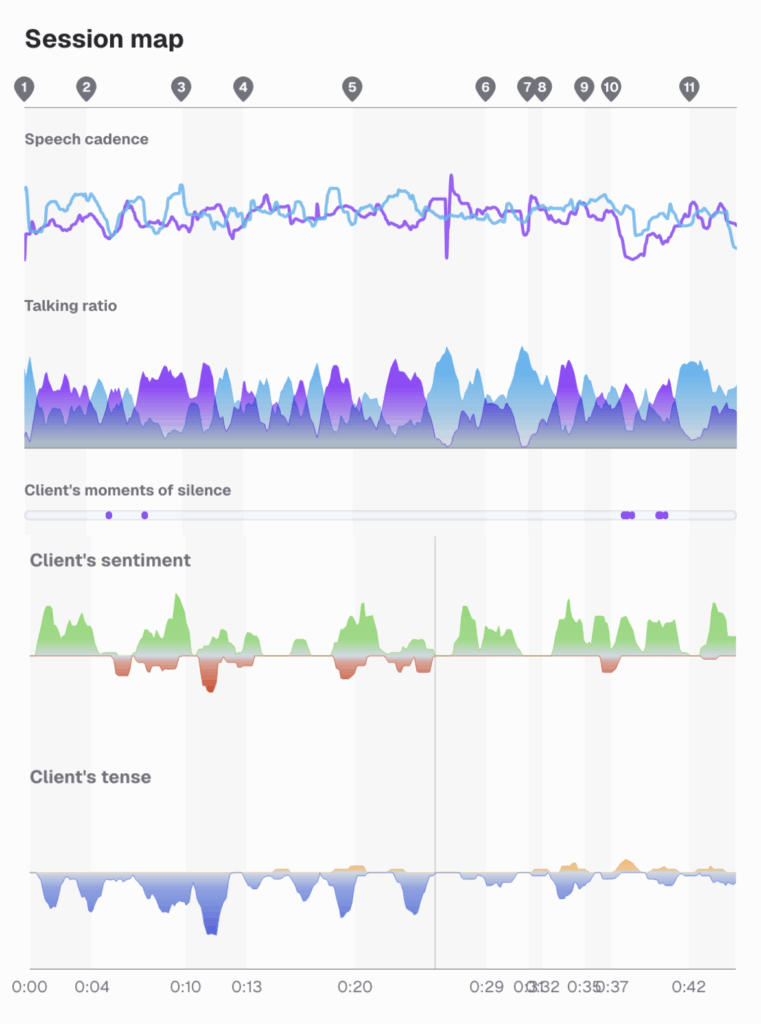
Ease of Use & Learning Curve: Mentalyc vs Upheal for Therapists
How intuitive is each platform for new users? How quickly can therapists get started?
Mentalyc
✅ Quick and Simple to Get Going
Just upload your sessions and start reviewing notes right away, no complicated setup, no unnecessary features to sift through. It’s built to give you exactly what you need from day one, with a focus on speed and simplicity.
✅ No or Minimal Setup Upfront
Even with advanced features like Alliance Genie™ or the SMART Treatment Plan builder, the app remains user-friendly and straightforward, working right out of the box with no configuration needed.
✅ Built for Every Brain
Guided by feedback from neurodivergent users, we’re shaping the app to be clearer, calmer, and easier to use—supporting focus and reducing overwhelm for those with ADHD and autism.
Upheal
✅ Modern Interface
Upheal has a sleek design, but its visual appeal doesn’t always translate into ease of use.
❌ Steep Learning Curve
Offers some additional features like calendar integration that require a bit more effort to configure. There’s definitely a learning curve at the start, especially when it comes to understanding the analytics and making sense out of it.
Access to Help & Customer Support: Upheal vs Mentalyc Comparison
Is it easy to get the support that you need?
Mentalyc
✅ In Mentalyc, you’ll find helpful resources like blogs, cheatsheets, and FAQs, plus responsive customer support and in-app guidance. But what really sets Mentalyc apart is its focus on real human connection—you can easily book a call and know for sure that a real person is on the other end, ready to guide you through any questions. No bots, no runaround—just thoughtful, personal support when you need it. This type of human-first customer service is rarely found in tech platforms and often sways decisions in Mentalyc vs Upheal Reddit discussions or therapist review groups.
Mentalyc vs Upheal reviews from real therapists
“I have had to contact customer service several times due to changes at my business, and it took a little to get what I needed done, but they are always courteous, friendly, and willing to work with me. Overall, excellent customer service.”
— Mentalyc’s User
Upheal
✅ Upheal Provides Help Articles and a Chatbot
Upheal provides helpful, easy-to-navigate articles and a virtual assistant (AI-powered chat) for quick answers. You can also reach out via email support.
❌ AI-Powered Chatbots First
The Choice is Yours: Deep Therapeutic Connection or Streamlined Video Recording?
Mentalyc – For therapists who want a trustworthy platform that does more than just document, but helps them connect, learn, and grow.
If you’re looking for robust, insurance-ready notes combined with tools to deepen client understanding and grow professionally, Mentalyc is the ideal choice. Designed with therapists in mind, it offers real-time, insightful analytics that feel like having a supervisor by your side. This helps you improve sessions effortlessly while ensuring accuracy and compliance, perfect for audit-ready clinical documentation and HIPAA-compliant note-taking for therapists.
“Mentalyc has allowed me to stay present during my sessions. Before, I would need to keep mental notes to ensure I capture as much details as I could to create a note. Now, with Mentalyc, I don’t have to focus on keeping mental notes for Mentalyc does that for me. Game changer and time saver!”
– Mentalyc’s User
This user experience highlights one of the platform’s biggest strengths in therapist workflow automation, something frequently searched in queries like “Mentalyc vs Upheal user reviews”.
Upheal – An option for therapists who value audio and video integration, plus extra features like calendar syncing and speech analytics.
Upheal combines session documentation with live audio and video capture. It supports your clinical work by providing speech pattern insights and an easy recording experience, making it a good choice for those who want comprehensive session records with minimal fuss.
“Honestly, overall, my experience with Upheal is GOOD.
Some challenges I experience the following:
- Incorrectly identifying male and female voice, even if the transcript speakers have been adjusted.
- Some interventions mention dialogue that happened that wasn’t correct
- Repetitive interventions under different categories
- Fixing the transcript can become time consuming when software isn’t clear on who said what.”
– Upheal’s User
Mentalyc vs Upheal – Pros & Cons
| Criteria | Mentalyc | Upheal |
| ✅ Pros | – HIPAA-compliant note-taking for therapists – Fast, accurate automated therapy progress notes – No video = better client privacy & consent – Minimal learning curve, intuitive UI – Offline recording support (on-device storage) – Ideal for insurance-ready, audit-proof notes – Popular among therapists for therapy software usability for clinicians – Strong analytics for clinical growth | – Integrated video and audio session capture AI tools – Rich visual analytics & speaker recognition – Zoom, calendar, and Google Meet integrations – Interactive visual tools (e.g. speech graphs) – Offers live session tracking – Useful for teams with heavy video needs |
| ❌ Cons | – No video support (by design) – Limited third-party integrations – Fewer features for team collaboration | – Video may raise consent/privacy concerns – Transcript accuracy varies, especially with multiple speakers – Some features (e.g. interventions) repeat or misclassify – UI/UX can be confusing or inconsistent – Higher learning curve for new users – May require transcript editing for insurance |
| Best For | Therapists prioritizing privacy, speed, accuracy, and clean note generation without complexity | Clinics or practices needing full video records and session visuals despite extra review time |
| Overall Verdict | Mentalyc wins for reliability, compliance, and ease-of-use | Good for specific use cases, but less efficient for everyday private practice |
Our Pick: Mentalyc
When comparing these platforms, Mentalyc immediately stands out as a more robust and trustworthy solution for therapists. You can make a registration on the Mentalyc platform with a free trial.
Why choose Mentalyc over Upheal?
When it comes to Upheal, the first impression is positive, but when using the platform daily, the missing parts become apparent, and the small, nice-to-have features fall into obscurity. Despite the modern interface, some actions are unclear or mysteriously locked, making navigation and operation difficult, while providing no further explanation or guidance.
Mentalyc shines because it sticks to what really matters: solid, reliable notes that are clinically approved and insurance-ready. It’s all about quality, data privacy, and HIPAA compliance—helping therapists grow professionally and document with confidence, without any extra fluff getting in the way.
Here’s how therapists describe the changes Mentalyc has brought to their practice:
Why other mental health professionals love Mentalyc

“I’m able to move in and out of doing my notes within that small five-minute gap between sessions. I’m able to keep compliance and rest assured everything is covered.”
Licensed Clinical Social Worker

“It’s so quick and easy to do notes now … I used to stay late two hours to finish my notes. Now it’s a breeze.”
Licensed Professional Counselor

“If I were recommending this software to a colleague, I would tell them that it is the best thing that they could do for their practice.”
Licensed Professional Counselor

“For anyone hesitant: this is a lifesaver. It will change your life, and you have more time to be present with your patients.”
Licensed Clinical Social Worker
